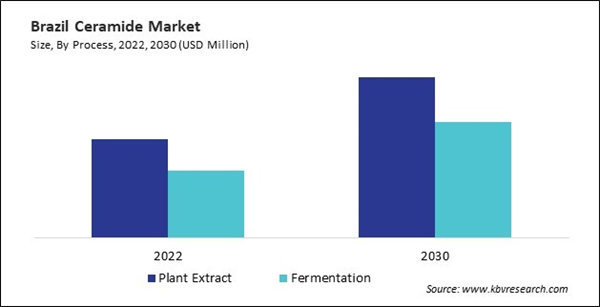In the market, synthetic ceramides play a crucial role in meeting the demand for innovative skincare solutions that offer consistent quality, stability, and customizable properties. Synthetic ceramides are chemically synthesized versions of the molecules found naturally in the skin, allowing for precise control over their structure and functionality. This enables manufacturers to tailor its formulations to address specific skincare concerns, such as aging, dryness, or sensitivity, with enhanced efficacy and performance. Therefore, the Brazil market would consume 6.30 tonnes of synthetic ceramides by 2030.
The Brazil market dominated the LAMEA Ceramide Market, By Country in 2022, and would continue to be a dominant market till 2030; thereby, achieving a market value of $3,774.1 Thousands by 2030. The Argentina market is showcasing a CAGR of 8.9% during (2023 - 2030). Additionally, The UAE market would register a CAGR of 7.4% during (2023 - 2030).
Companies harness digital technology and data analytics to gather insights into consumers' skin characteristics, behaviors, and preferences, enabling the development of tailored skincare solutions. AI-driven algorithms analyze vast datasets, including consumer feedback, skin measurements, environmental factors, and genetic predispositions, to identify patterns and correlations that inform personalized product recommendations.
Furthermore, innovations in delivery systems and formulation techniques enhance its bioavailability and skin penetration, maximizing their therapeutic potential. Liposomal encapsulation, nano-emulsions, and microencapsulation technologies enable controlled release and targeted delivery of the chemical to specific skin layers, improving their absorption and efficacy while minimizing potential side effects.
Brazil is a major agricultural producer with various natural ingredients. Brazilian food processors could use these resources to innovate by incorporating ceramides into traditional food products. For example, ceramide-rich oils or extracts from locally sourced plants could be used in cooking oils, spreads, or condiments, providing added skincare benefits. As per the data released by the United States Department of Agriculture, according to the Brazilian Food Processors’ Association (ABIA), the country's food processing sector registered revenues of R$922.6 billion (US$171 billion) in 2021, an increase of 16.9 percent compared to 2020. Hence, the growing food and beverage sector and food processing sector in LAMEA can help in the growth of the regional market.
Based on Application, the market is segmented into Cosmetics, Food, and Others. Based on Process, the market is segmented into Plant Extract, and Fermentation. Based on Type, the market is segmented into Natural, and Synthetic. Based on countries, the market is segmented into Brazil, Argentina, UAE, Saudi Arabia, South Africa, Nigeria, and Rest of LAMEA.
List of Key Companies Profiled
- Ashland Inc.
- Toyobo Co., Ltd.
- Doosan Corporation
- Arkema S.A.
- Evonik Industries AG (RAG-Stiftung)
- Cayman Chemical Company, Inc.
- Kao Corporation
- Croda International PLC
- Vantage Specialty Chemicals (H.I.G. Capital, LLC)
- Incospam Co., Ltd.
Market Report Segmentation
By Application (Volume, Tonnes, USD Million, 2019-2030)- Cosmetics
- Food
- Others
- Plant Extract
- Fermentation
- Natural
- Synthetic
- Brazil
- Argentina
- UAE
- Saudi Arabia
- South Africa
- Nigeria
- Rest of LAMEA
Table of Contents
Companies Mentioned
- Ashland Inc.
- Toyobo Co., Ltd.
- Doosan Corporation
- Arkema S.A.
- Evonik Industries AG (RAG-Stiftung)
- Cayman Chemical Company, Inc.
- Kao Corporation
- Croda International PLC
- Vantage Specialty Chemicals (H.I.G. Capital, LLC)
- Incospam Co., Ltd.









